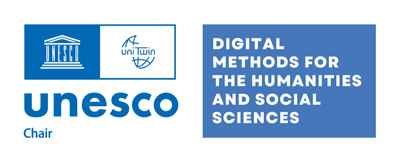Focus Group Discussion on Training Archaeologists in Digital Tools and Methods
Round Table - CAA 2025 (52nd International Conference on Computer Applications and Quantitative Methods in Archaeology, Athens, Greece, 5 - 9 May 2025)
The encounter of Digital Technology and Archaeology has led to transformative changes to the research methodologies employed in the latter, in pace with the broader transformation fuelling the fields of Digital Humanities and Heritage. The emergence and adoption of digital tools and methods has significantly boosted the ability of researchers to manage and analyze extensive datasets, by applying complex methodologies with greater efficiency and accuracy and to formulate and test working hypotheses that would have previously been beyond the scope of the discourse. Despite these benefits, the use of and reliance on digital tools have introduced new challenges.
Researchers in Archaeology are experienced in handling complex datasets and therefore digital tools and methods are valuable for managing data, however they frequently encounter difficulties in getting familiar with, selecting and employing tools and methods that are reusable and adaptable to their specific needs and requirements. Sometimes the use of digital information management and analysis tools appears to be opaque or to become a self-contained exercise. This presents technical, scholarly and communicative challenges, hindering collaborative and transparent research practices, or even at times casting doubt on the soundness or usefulness of applying those methods. In response to these challenges, the UNESCO Chair on Digital Methods for the Humanities and Social Sciences, aims at advancing the digital transformation of the way of working in the Humanities and the Social Sciences within an extensive web of international collaborations under the auspices of UNESCO.
In this context, the Chair has joined the EU project “Advancing FronTier Research In the Arts and hUManities” (ATRIUM, https://atrium-research.eu). ATRIUM aims to enhance access to digital research infrastructures, build capacity and bridge gaps in frontier knowledge within the Arts and Humanities, with a special focus on Archaeology. As part of our role in ATRIUM, we actively contribute to a strand of work on the Skillset Assessment, the goal of which is to provide a) a general assessment of the skills (knowledge, abilities, and competencies) required for the active use of services provided by ATRIUM (as part of the broader ecosystem of Digital Humanities tools and services) with particular attention to the issues of the digital gap between the lesser and better-resourced countries and communities; and b) a set of recommendations about the topics and modalities of the training materials available or to be developed as part of the ATRIUM Curriculum.
In the framework of the 52nd International Conference on Computer Applications and Quantitative Methods in Archaeology (CAA 2025) and in line with the UNESCO Chair’s objectives in ATRIUM, we propose a focus group discussion on 'Training Archaeologists in Digital Tools and Methods' which will serve as a platform for archaeologists of various career levels and professional roles to exchange experiences and strategies for effective training in digital methods. It will also address the challenges and opportunities presented by the integration of digital technologies in archaeological practice, as they feed into training requirements. Τhe insights gained from this focus group discussion will be used by the UNESCO Chair in co-designing, together with other ATRIUM partners, a comprehensive set of training material to be hosted, maintained and sustained on DARIAH-Campus, DARIAH’s discovery framework and hosting platform for learning resources (https://campus.dariah.eu/). The ATRIUM Curriculum will embed the description of ATRIUM services into the broader pedagogical scope focused on cross-disciplinary digital methods and wide-ranging competencies in FAIR and Open Science, as well as serve disciplinary-specific training requirements in the field of Archaeology.
The focus group discussion will be structured to facilitate an in-depth exchange of ideas among participants. We will select and invite 8-10 researchers and practitioners from various archaeological fields, career levels and professional roles, preferably also from different countries, ensuring a diverse range of perspectives and experiences. Prior to the focus group discussion, we will circulate preparatory documents outlining the key topics and questions to be addressed. This will help participants prepare and contribute meaningfully to the discussion.
For more information and if you are interested in being a panelist, please visit: https://2025.caaconference.org/call-for-papers/round-tables/#S56.


